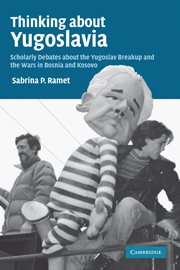 Thinking about Yugoslavia
Thinking about Yugoslavia Book contents
- Frontmatter
- Contents
- Preface
- List of books discussed
- Glossary
- 1 Debates about the war
- 2 The collapse of East European communism
- 3 The roots of the Yugoslav collapse
- 4 Who's to blame, and for what? Rival accounts of the war
- 5 Memoirs and autobiographies
- 6 The scourge of nationalism and the quest for harmony
- 7 Milošević's place in history
- 8 Dilemmas in post-Dayton Bosnia
- 9 Crisis in Kosovo/a (with Angelo Georgakis)
- 10 Debates about intervention
- 11 Lands and peoples: Bosnia, Croatia, Slovenia, Serbia
- 12 Southern republics: Macedonia and Montenegro in contemporary history
- 13 Conclusion: controversies, methodological disputes, and suggested reading
- Index
- References
10 - Debates about intervention
Published online by Cambridge University Press: 22 September 2009
- Frontmatter
- Contents
- Preface
- List of books discussed
- Glossary
- 1 Debates about the war
- 2 The collapse of East European communism
- 3 The roots of the Yugoslav collapse
- 4 Who's to blame, and for what? Rival accounts of the war
- 5 Memoirs and autobiographies
- 6 The scourge of nationalism and the quest for harmony
- 7 Milošević's place in history
- 8 Dilemmas in post-Dayton Bosnia
- 9 Crisis in Kosovo/a (with Angelo Georgakis)
- 10 Debates about intervention
- 11 Lands and peoples: Bosnia, Croatia, Slovenia, Serbia
- 12 Southern republics: Macedonia and Montenegro in contemporary history
- 13 Conclusion: controversies, methodological disputes, and suggested reading
- Index
- References
Summary
Since 1999, the United States and Britain have carried out three armed interventions against authoritarian regimes – in the now-defunct Federal Republic of Yugoslavia (FRY) in 1999 (over Kosovo), in Afghanistan in 2001, and in Iraq most recently. In all of these cases, the United Nations was marginalized and brought in only after the fact, for the purpose of legitimating the intervention. Already there are widely reported rumours that the George W. Bush administration has intentions to topple the regimes in North Korea, Syria, Saudi Arabia, and even Jordan, replacing them with secular-democratic governments. Inevitably, these interventions have stirred controversy, with Noam Chomsky even offering the un-Bodinian definition of sovereignty as ‘the right of political entities to be free from outside interference’.
Where Yugoslavia is concerned – and here I am using the term ‘Yugoslavia’ to refer simultaneously to the Socialist Federated Republic of Yugoslavia which expired in 1991 and to its successor states – the debate, waged both in policy-making circles and in academic publications, assumed the form of a three-sided struggle. On the one hand, there were the realist-isolationists, whom I have elsewhere referred to as ‘relativists’, who tended to dwell on two principal themes: the need to weigh the interests and likely costs for the United States (and the West) before undertaking a military intervention, and the importance of respecting the sovereignty of all states, regardless of their character.
Information
- Type
- Chapter
- Information
- Thinking about YugoslaviaScholarly Debates about the Yugoslav Breakup and the Wars in Bosnia and Kosovo, pp. 220 - 242Publisher: Cambridge University PressPrint publication year: 2005